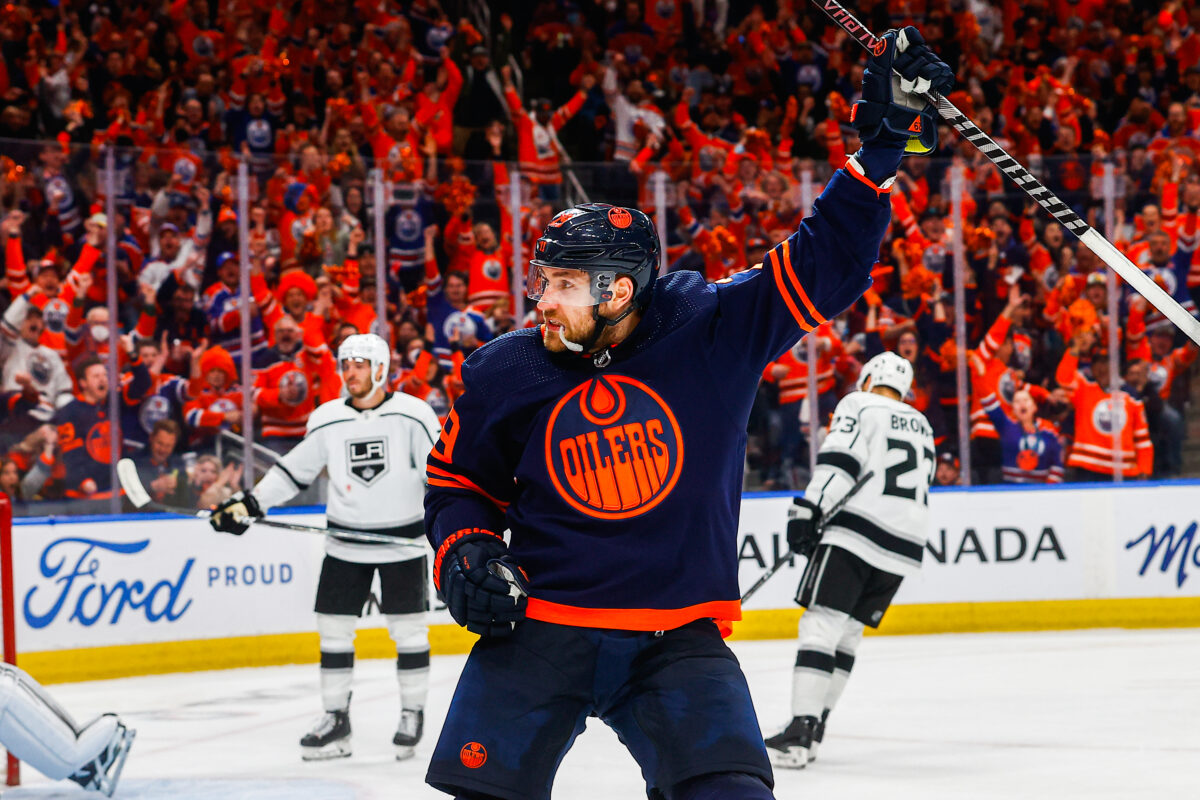Edmonton Oilers fans continue to hold their breath while they wait for a contract extension for superstar Leon Draisaitl. While most expect Draisaitl to re-sign with the Oilers, each day that passes without an announcement is worrisome. While Draisaitl could demand north of $14 million annually on the market if he becomes a free agent after this season, the Oilers could look to the Carolina Hurricanes to bring down the average annual value (AAV) on Draisaitl’s next deal.
Related: Maple Leafs Should Utilize Deferred Payment with Marner’s Next Contract
The Hurricanes recently extended forward Seth Jarvis on an eight-year contract worth $7.42 million annually. However, Jarvis’ new deal has a deferred payment structure, which means some of the money he earns from signing bonuses gets paid to him the day after the current deal ends on July 1, 2032. While Draisaitl and Jarvis aren’t comparable players, the Oilers could do something similar to give Draisaitl the money he deserves, while bringing down the cap hit.
In the new Jarvis deal, the Hurricanes will defer $15.67 million of his total contract which stems from his signing bonus in years one, two, and seven of the contract. As explained below by PuckPedia, almost each year of the contract has a different money payout which impacts his cap hit for that specific season.
Jarvis #Canes 8 year $7.42M Cap Hit:
— PuckPedia (@PuckPedia) August 31, 2024
Yr 1 $2M Base & $7.233M Signing Bonus
Yr 2 6M & 3.41M SB
Yr 3 4.25M & 4M SB
Yr 4 6.57M
Yr 5 6.57M
Yr 6 6.57M
Yr 7 1M & 5.187M SB
Yr 8 1M & 5.57M SB
Amounts above include the present value of all deferred compensation. 15.67M Total is…
This type of deal has not been seen for a while. While the Phoenix Coyotes did it for Shane Doan’s contract, more recently, the MLB’s Los Angeles Dodgers’ superstar Shohei Ohtani had $680 million of his contract deferred until after his current deal was complete. This gives the Dodgers an advantage every season to try and compete with that extra money as Ohtani defers $68 million per season and only makes $2 million annually while playing.
While Jarvis is a huge part of the Hurricanes’ future, this contract structure was unexpected. But, it was a smart move by management. By the end of his eight-year deal, the Hurricanes will be in a completely different category and likely won’t be contending anymore, giving them the chance to rebuild when he becomes a free agent. At the same time, that $15.67 million sits against the cap for only one season, which shouldn’t cause any issues if they’re in the middle of a rebuild by that point.
Oilers Should Use Similar Strategy With Draisaitl
If the Oilers wanted to save some money while they continued to contend for a Stanley Cup for the next few seasons, they should take a similar approach. While many people have tried to predict what Draisaitl will be asking for on his next contract, it’s safe to assume it will be around $13 million annually. With some deferred money, the Oilers could drop that to around $12 million per season.

A deferred contract would help management re-sign players who need new deals in the coming season, including Connor McDavid and Evan Bouchard. Saving some money on Draisaitl’s cap hit, and if all three are open to taking less money to remain in Edmonton, the Oilers will be able to sign free agents or add big names at the trade deadline.
Using the Jarvis extension as a reference could speed up the process for Draisaitl and the Oilers. Now that there is a different way to get an extension completed, it wouldn’t be surprising if the two sides sped up negotiations heading toward training camp, and this was the structure they followed. This unorthodox extension would benefit the Oilers and the team’s future. On top of that, I wouldn’t be surprised if many teams started to use this strategy to help themselves out.
Whether or not the Oilers decide to explore this route during negotiations with Draisaitl, it’s worth considering.
